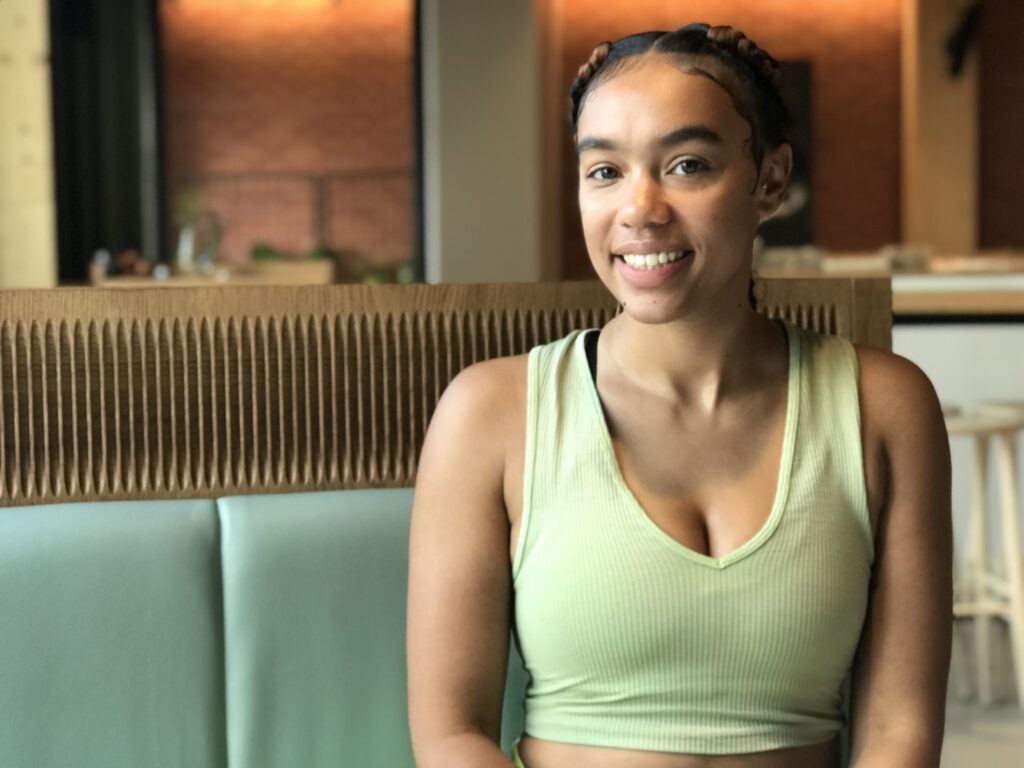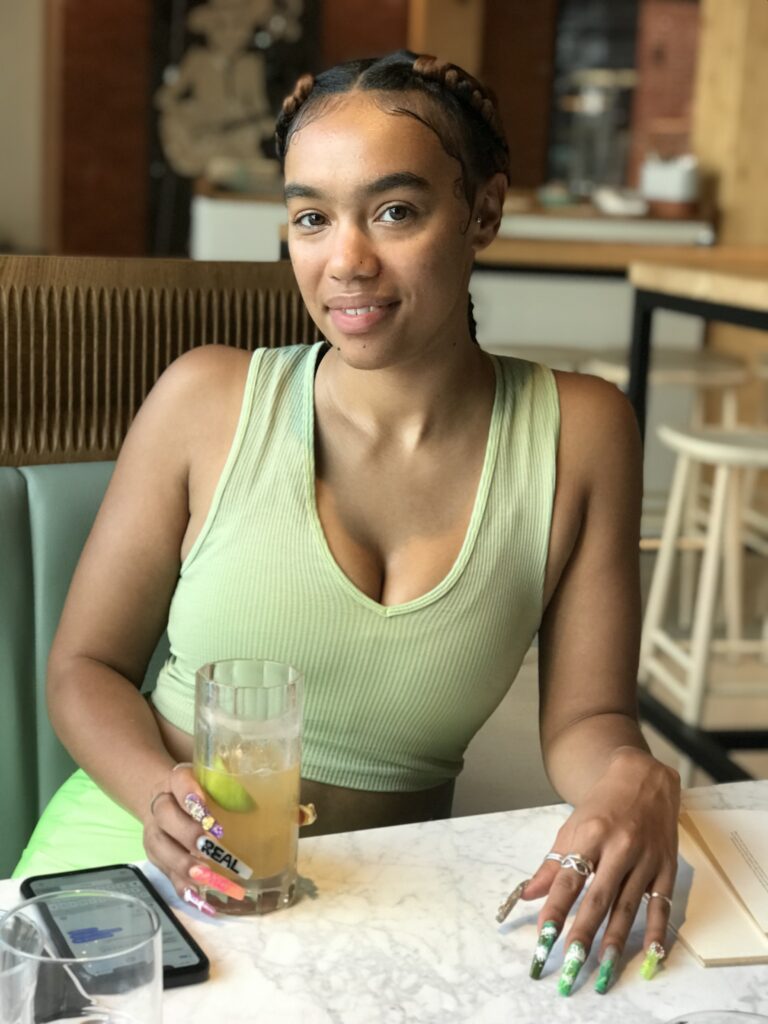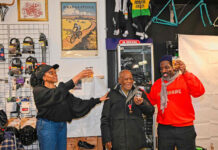Poppy Woods chats to Gabriella Lafor about her residency at The Department Store Studios, multiple companies and making space for black and brown oriented programming, narratives, nuance and careers in the television industry
When Gaby meets me in the reception of The Department Store studios a change occurs. A minute before I was sat in its cool calm; quiet in its cavernous space. Then she arrives and it’s full. It is rare to meet someone so young with such self-assurance and, although I am yet to discover the full depths of this, even greater ability. She apologises for being late and tells me she has just jumped off a conference call, gesturing with a nail that declares REAL to the office space. We walk through the studios and to The Department Store’s most recent edition: a mediterranean fine dining spot called Bellefields. As it is the last warm day of the year and (just) past midday we decide on cocktails. Sitting across from this graceful whirlwind of a woman, striking in shades of green, I know I am in the presence of immense potential. I am the camera as it does the close up on the final inhale of the next Olympic gold diver. Before continuing I feel I must clarify that I do not reiterate aspects of Gaby’s physical presentation through gendered bias but rather: find me a male entrepreneur who presents this well and I will wax with equal lyricism about them. You cannot? Shocker.
‘This Brixton punch sounds like a bit of me to be honest.’
She says, listing its ingredients:
‘Rum, pineapple, ginger, ginger bread and lime-apparently.’
And I think it does and could not have been better had I fictionalised it and then without hesitation, order the same thing.
My initial judgement is correct, this woman is a born leader. The cocktail is excellent. At only 24 Gabriella Lafor (or Gaby), is incredibly poised and remarkably driven. Gaby applied to The Department Stores call out for local artists after seeing the opportunity advertised in Creative network mailing lists and says as soon as she saw it she knew she had to. Having previously had success but also disappointing setbacks with investors, she says ‘everything happens for a reason’ and it is ‘a time in our life when we were like: let’s just go for everything.’ She goes on to say of the application and interview process:
‘It was just one of those things, it was an opportunity that you just can’t let pass you by and I grabbed it with both hands. And I knew exactly what I could bring. And that’s all I spoke on… I had meticulously planned each month of the residency, telling them what events that I’d be interested in running, who I would invite, what kind of impact that would have on on the rest of our community, and also the community that exists here. So it was just like a meeting of networks, basically. And they loved it.’
Creating space for people of colour within the creative industry is at the heart of everything Gaby does, a ‘response to the fact that currently in the television industry, there is just no space for black and brown oriented programming’. Initially she set about achieving this goal through the creation of a production company she intends to grow into a streaming platform. ‘Line Stream’, which already has connections with multiple production companies in the UK for pitches and paid development and one show already partnered with a BBC 3 commissioner. She says that despite some improvements, such as 24 hour takeover initiatives, there is still no space ‘dedicated to the black experience’ in the UK media, which instead functions to uphold a culture of:
‘…you guys get a season or you guys get a 24 hour takeover? It’s like, oh, so we’re only black for a season? Really you’re choosing purposefully then to ignore and actually erase the nuances of our experiences within the black and brown community…’
The result of this aspect of underrepresentation is so much more than what it first seems and has a huge effect at both macro and micro levels, particularly on the way the community is perceived. For example, Gaby says, there is no representation of the diversity of backgrounds and classes of black and brown identities in UK media. The result of which is not only negative for outsider perspectives but also for the esteem of those within the community who are seeking role-models represented in the media. The current representation, she says:
‘gives the indication that our community only survives through poverty and only lives through such oppressive environments, when really we have so much more than that and…the more that we get to see it and share it and show it…will inspire a whole new generation of people to really achieve greater and dream bigger than themselves.’
This is what led her to the realisation that in order to achieve representation on-screen, space also had to be made off-screen. Rather than looking elsewhere for a solution to this, she decided to launch her own Talent network, ‘Line Light’ because: ‘we are missing out on so many fundamental stories and so much beautiful brilliant talent, just because we don’t have that central place of reference.’ She is already having great success in her mission to become that central place of reference, her network is currently 100 people strong, ‘full of writers, producers, directors and researchers’ who she hopes can work together to break into what has previously been a very exclusive and secretive industry, through education and:
‘a mutual exchange of resources, knowledge and opportunities…because we need to move away from this culture of nepotism, you can’t continue to employ and hire and engage with people who are in the same image as you and never grow as a business, you’ll never grow as a person and being able to have authentic connections with a new network of people who are from different backgrounds means that you are opening yourself up for more things to go right’

As well as launching and running a 100 strong talent network and a production company with five shows already in paid development, Gaby also manages to find time for personal endeavours. Currently, she is production manager on a short film about Olive Morris, a key and largely unrecognised figure in Brixton’s history; a young woman who came over from Jamaica in the Windrush generation and protested and rallied for social justice for black communities. She is also producing a music video and editorial piece for a magazine on the diaspora and male identities called ‘Boy.Brother.Friend’. Looking into the near future, Gaby has just landed a production management role on a web series and is excited to start using the Department Stores screening room to show the work she and her company are creating. Gaby says ‘right now it’s very much a divide and conquer kind of agenda’ and:
’ultimately, we’re showing the industry that this is what we are going to be received for and this is our reputation. This is real proof that by sharing your network and exploring options that you otherwise would turn away or dismiss that you’re actually getting some really fresh ideas through the door and they profit too.’
The best way to describe Gaby, her work and attitude towards the world is through her own words: ‘I just always come in, bring some doors down and let more people in basically.’ If you don’t already know her, then you should and almost definitely will over the next few years. As Brixtons own gold medalist steps off the top board we should all be watching. When I leave Bellefields and turn to wave, Gaby is already answering the next video conference call with a swish of REAL. When she asks ‘Where are all of these other representations that we so desperately need to improve the esteem of our community?’ I can’t help but think, right here in front of me and hope we are finally ready to make space.







